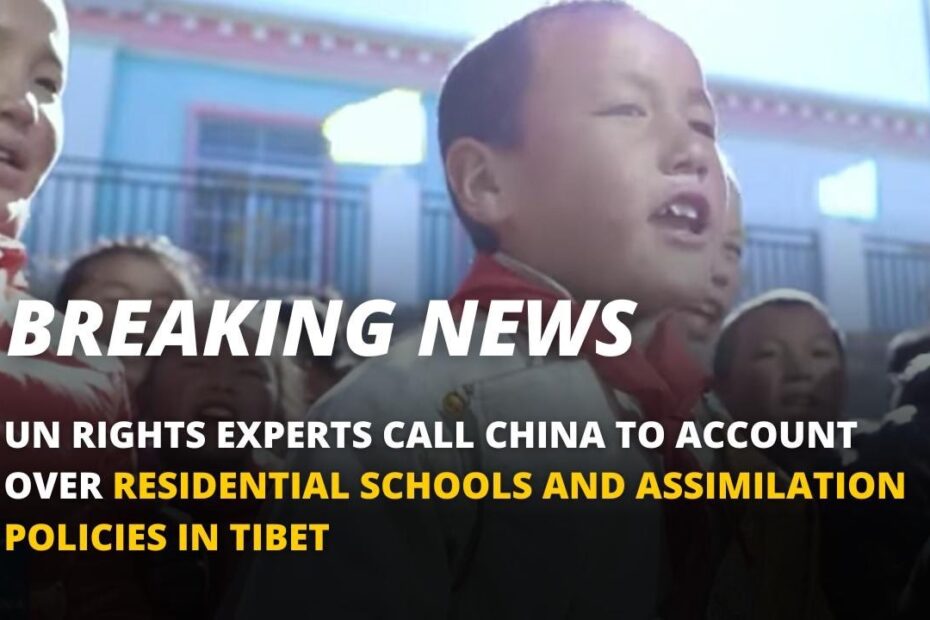78% of Tibetan students aged 6 to 18 separated from their families and forced into China’s colonial boarding school system in Tibet
UN human rights experts have raised urgent concern about China’s residential [1] schools in Tibet, which are part of a “large scale campaign [by the Chinese authorities] to assimilate Tibetan culture and language.” The Special Rapporteurs spotlighted the “substantial increase in the number of residential schools operating in Tibet and in the number of Tibetan children living in them,” as well as that preschools in Tibet are required to operate in Mandarin Chinese despite Chinese government claims to the contrary.
Special Rapporteurs on the right to education, cultural rights, freedom of religion or belief and minority issues raise concern about China’s policies that attempt to assimilate Tibetan culture into Chinese “through a series of oppressive actions against Tibetan educational, religious and linguistic institutions, in contradiction with the right to freedom of religion and belief, the right to education and cultural rights of the Tibetan people.”
The UN human rights experts’ concerns follow findings by Tibet Action Institute [2] that Chinese government policies in occupied Tibet [3] are forcing three out of every four Tibetan students between the ages of six and 18 into a vast network of colonial boarding schools. In addition, at least 100,000 four- and five-year-old children are estimated to be separated from their parents and living in boarding preschools [4] for at least five days in a week. [5]
Tibetan leaders and rights advocates have denounced China’s colonial boarding schools in Tibet as a part of a program of cultural genocide, and have brought the issue before the United Nations in order to shine a spotlight on this previously unknown policy that threatens to eliminate Tibetan childrens’ connection with their unique cultural identity within a generation.
Separated from their families and communities and almost completely cut off from their traditional culture, the nearly one million Tibetan children living in colonial boarding schools are forbidden to practice their religion, taught mainly in Chinese, and subjected to intense political indoctrination. “Students are restricted in following traditional Tibetan religious practices connecting them back to their families and communities”, the UN experts note.
The loss of family connection and support causes Tibetan children in these residential schools severe levels of alienation and trauma. As the UN experts make clear, it “produces deep and serious negative psychological and social impacts on such children, including loss of family connections, apathy, anxiety, interaction disorders, feelings of loneliness, isolation, alienation, homesickness, and other forms of physical or emotional distress.”
Reports from Tibet indicate that Chinese authorities use a variety of methods to coerce parents into sending their children away to these state-run institutions, including closing local schools so as to leave no other schooling alternatives. Those who dare to resist are subject to intimidation and threatened with financial and other punishments.
The communication was issued to the Chinese government on 11 November 2022 and they were requested to reply within 60 days. As of yet, they have failed to issue a response.
Lhadon Tethong, Director of Tibet Action Institute, said:
“We welcome this critical action by UN human rights experts exposing China’s horrific policy of separating almost a million Tibetan children from their families. We urge governments to take concerted action to hold China accountable and end China’s colonial boarding school system in Tibet which is in flagrant violation of international law. As a mother of three young children, the idea of being forced to send them away is one of the worst nightmares I can imagine. That this suffering and trauma is being experienced by almost every family in Tibet — right now — is horrifying.”
Gloria Montgomery, Coordinator of Tibet Advocacy Coalition, said:
“Today’s communication marks a turning point. Top UN experts have now sent an unequivocal and long overdue message: China’s residential boarding school system, which is part of a residential school policy to eradicate Tibetan language, culture and community, can no longer go unaddressed. The international community must now follow suit and urgently take meaningful action to hold the Chinese authorities accountable for these crimes. If we stand on the sidelines and do not act, we will witness the human rights of an entire culture collapse.”
Dr Gyal Lo, a Tibetan scholar and education expert, said:
“There is no longer Tibetan education in Tibet. The Chinese government’s colonial boarding school policies are designed to completely subsume Tibetans into the occupier’s culture. As an education expert who fled Tibet in 2020, I’ve been working to sound the alarm on these residential schools and the devastating impact they are having on the wellbeing of an entire generation of Tibetan children. Today’s action by four UN experts is desperately needed as we reach a tipping point for the protection of the Tibetan way of life.”
—
CONTACTS:
Lhadon Tethong, Tibet Action Institute, +1 (917) 418-4181
Gloria Montgomery, Tibet Advocacy Coalition, +44 7541362001
Tenzin Dorjee, Tibet Action Institute, +1 646-724-0748
Mandie McKeown, International Tibet Network, +44 7748 158618
NOTES TO EDITORS:
- Special Rapporteur on minority issues; the Special Rapporteur in the field of cultural rights; the Special Rapporteur on the right to education and the Special Rapporteur on freedom of religion or belief: https://spcommreports.ohchr.org/TMResultsBase/DownLoadPublicCommunicationFile?gId=27444
- See Tibet Action Institute, “Separated From Their Families, Hidden From the World: China’s Vast System of Colonial Boarding Schools Inside Tibet,” 2021, pg. 17-21, available at: https://tibetaction.net/wp-content/uploads/2022/12/2021_TAI_ColonialBoardingSchoolReport_Digital.pdf
- Historical Tibet includes the Tibet Autonomous Region and Tibetan Autonomous Prefectures and Counties in Qinghai, Gansu, Sichuan, and Yunnan Provinces.
- In China these programs are described as “kindergarten.” In Tibetan areas, preschool education consists of at least two years of Mandarin-medium instruction, misleadingly called “bilingual education.”
Tibet Action Institute “Eyewitness: China Operating Mandatory Boarding Preschools Across Tibet, 2022: https://tibetaction.net/2022/05/24/eyewitness-confirms-mandatory-boarding-preschools-operating-across-tibet/
